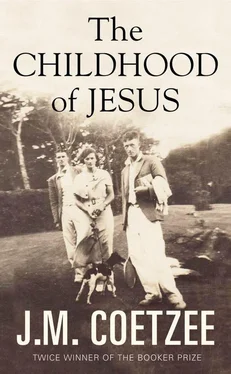‘Or a seal.’
‘A bird or a seal. Or even a great big whale. There are no limits to what you can be in the next life.’
‘Will you and I go to the next life?’
‘Only if we die. And we are not going to die. We are going to live a long time.’
‘Like heroes. Heroes don’t die, do they?’
‘No, heroes don’t die.’
‘Will we have to speak Spanish in the next life?’
‘Definitely not. On the other hand, we may have to learn Chinese.’
‘And Inés? Will Inés come too?’
‘That is for her to decide. But I am sure that if you go to the next life, Inés will want to follow. She loves you very much.’
‘Will we see Marciano?’
‘Undoubtedly. However, we may not recognize him. We may think we are just seeing a bird or a seal or a whale. And Marciano — Marciano will think he is seeing a hippopotamus while it will really be you.’
‘No, I mean the real Marciano, at the docks. Will we see the real Marciano?’
‘As soon as the hold is pumped dry, the captain will send men down to fetch Marciano’s body. But the real Marciano will no longer be among us.’
‘Can I see him?’
‘Not the real Marciano. The real Marciano is invisible to us. As for the body, the body that Marciano has escaped from, by the time we get to the docks it will have been taken away. The men will do that at first light, while you are still asleep.’
‘Taken where?’
‘Taken to be buried.’
‘But what if he isn’t dead? What if they bury him and he isn’t dead?’
‘That won’t happen. The people who bury the dead, the gravediggers, are careful not to bury someone if he is still alive. They listen for a heartbeat. They listen for breathing. If they hear even the tiniest heartbeat, they won’t bury him. So there is no need to worry. Marciano is at peace —’
‘No, you don’t understand! What if his tummy is full of smoke but he isn’t really dead?’
‘His lungs. We breathe with our lungs, not our tummies. If Marciano took smoke into his lungs he will certainly have died.’
‘It’s not true! You are just saying that! Can we go to the docks before the gravediggers get there? Can we go now?’
‘Now, in the dark? No, we certainly can’t. Why are you so eager to see Marciano, my boy? A dead body isn’t important. It is the soul that is important. The soul of Marciano is the real Marciano; and the soul is on its way to the next life.’
‘I want to see Marciano! I want to suck the smoke out of him! I don’t want him to be buried!’
‘David, if we could bring Marciano back by sucking the smoke out of his lungs, then the sailors would have done so long ago, I promise you. Sailors are just like us, full of goodwill. But you can’t return people to life by sucking their lungs, not after they are dead. It’s one of the laws of nature. Once you are dead you are dead. The body doesn’t come back to life. Only the soul lives on: Marciano’s soul, my soul, your soul.’
‘That’s not true! I don’t have a soul! I want to save Marciano!’
‘I won’t allow it. We will all go to Marciano’s funeral, and at the funeral you will have a chance, like everyone else, to kiss him goodbye. That is how it will be, and that is the end of it. I am not going to discuss Marciano’s death any further.’
‘You can’t tell me what to do! You are not my father! I am going to ask Inés!’
‘I can assure you Inés won’t tramp down to the docks with you in the dark. Be sensible. I know you like to save people, and that is admirable, but sometimes people don’t want to be saved. Let Marciano be. Marciano is gone. Let us remember the good things about him, and let go of his shell. Come now: Inés is waiting to tell you your bedtime story.’
By the time he presents himself for duty the next morning, the pumping of the aft hold is almost completed. Within an hour a team of seamen is able to descend; and soon afterwards, while the dockers watch in silence from the quayside, the body of their deceased comrade, strapped to a stretcher, is borne up on deck.
Álvaro addresses them. ‘In a day or two we will have a chance to say a proper goodbye to our friend, lads,’ he says. ‘But for now it is work as usual. There is an unholy mess in the hold, and it is our job to clean it up.’
For the rest of the day the stevedores are down in the hold, ankle deep in water, enveloped in the acrid smell of wet ash. Every single sack of grain has burst; it is their task to shovel the sticky mess into buckets and pass these by relay up to the deck, from where they are dumped overboard. It is a joyless labour, carried out in silence in a place of death. When he calls at Inés’s apartment that evening, he is exhausted and in a dark mood.
‘You don’t happen to have anything to drink, do you?’ he asks her.
‘Sorry, I’m out of everything. I’ll make you some tea.’
Sprawled on his bed, the boy is absorbed in his book. Marciano is forgotten.
‘Hello,’ he greets him. ‘How is the Don today? What is he up to?’
The boy ignores the question. ‘What does that word say?’ he asks, pointing.
‘It says Aventuras , with a big letter A . The Adventures of Don Quixote.’
‘And that word?’
‘ Fantástico, with an f . And that word — remember the big letter Q ? — is Quixote . You can always recognize Quixote by the big Q . I thought you told me you knew the letters.’
‘I don’t want to read letters. I want to read the story.’
‘That is not possible. A story is made up of words, and words are made up of letters. Without letters there would be no story, no Don Quixote. You have to know the letters.’
‘Show me which is fantástico .’
He places the boy’s forefinger on the word. ‘There.’ The fingernails are clean and neatly pared; whereas his own hand, which used to be as soft and clean, is cracked and dirty, with grime worked deep into the cracks.
The boy squeezes his eyes shut, holds his breath, opens his eyes wide. ‘ Fantástico .’
‘Excellent. You have learned to recognize the word fantástico . There are two ways of learning to read, David. One way is to learn the words one by one, as you are doing. The other way, which is quicker, is to learn the letters that make up the words. There are only twenty-seven of them. Once you have learned them, you can spell out strange words for yourself, without having me tell you each time.’
The boy shakes his head. ‘I want to read the first way. Where is the giant?’
‘The giant who was really a windmill?’ He turns the pages. ‘There is the giant.’ He places the boy’s forefinger on the word gigante .
The boy closes his eyes. ‘I’m reading through my fingers,’ he announces.
‘It doesn’t matter how you read, through your eyes or through your fingers like a blind person, as long as you read. Show me Quixote , with a Q .’
The boy stabs at the page with his finger. ‘There.’
‘No.’ He moves the boy’s finger to the right place. ‘There is Quixote , with the big Q .’
The boy snatches his hand away petulantly. ‘That’s not his real name — don’t you know?’
‘It may not be his worldly name, the name his neighbours know him by, but it is the name he chooses for himself and the name we know him by.’
‘It’s not his real name.’
‘What is his real name?’
Abruptly the boy withdraws into himself. ‘You can go,’ he mutters. ‘I am going to read by myself.’
‘Very well, I will go. When you come to your senses again, when you decide you want to learn to read properly, call me. Call me and tell me the Don’s real name.’
Читать дальше












